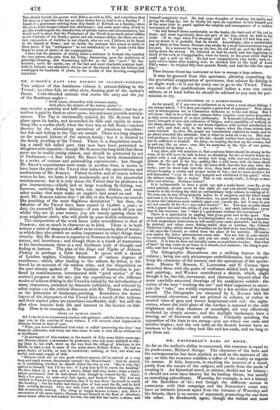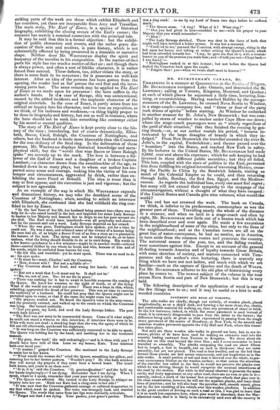MR. WHITEHEAD ' S EARL OF ESSEX.
As far as the author's ability is concerned, this romance is equal to its predecessor, Richard Savage. The character of the hero and his contemporaries has been studied, as well as the manners of the age ; so that the romance exhibits a reflex of the reality as regards its matter. It fails, however, in exciting the interest of a novel, partly from the nature of the subject, and partly from the mode of treating it. An historical novel, to attract, should not be history ; it should not even have history for its leading theme, but merely as something subordinate. Waverley, for example, is not a history of the Rebellion of '45 ; and though the different' scenes in connexion with that campaign and the Pretender's court may have an intrinsic interest apart from the fortunes of Waverley and his friends, there is no means of separately presenting the one from the other. In Kenilworth, again, though the richest and most striking parts of the work are those which exhibit Elizabeth and her courtiers, yet these are inseparable from Amy and Tressilian. The main story, The Earl of Essex, is a species of historical biography, exhibiting the closing scenes of the Earl's career; the romance has merely a nominal connexion with the principal tale. It may be said that this is a formal objection : but the exhibi- tion of public characters and events, and the rather grave dis- cussion of their acts and motives, is pure history, which is not substantially affected by being presented in a dramatic or narrative shape. Neither does Mr. WHITEHEAD display the spirit and buoyancy of the novelist in his composition. In the matter-of-fact parts his style has too much a matter-of-fact air ; and though there is always power, and often a sort of lifelike character, it is rather forced than natural. These defects, too, either vitiate the story, or there is some fault in its scructure; for it possesses no well-knit interest. After an idea of the persons has been gotten from the
opening, the reader had as lief peruse the end first and the inter-
vening parts last. The same remark may be applied to The Earl of Essex as we made upon its precursor : the hero suffers in the
author's hands. In the case of Savage, this was unintentional, caused by the added incidents and the unplastic character of the original materials. In the case of Essex, it partly arises from too critical an inquiry into his character, and too true an exposition, as we think, of his rashness and weakness,—a thing highly proper to be done in biography and history, but not so well in romance, where the hero should not be sunk into something like contempt either by his moral or mental qualities.
The story of The Earl of Essex is kept pretty close to the bis- tory of the time ; introducing, but of course dramatically, Eliza- beth, Bacon, Cecil, Raleigh, the Countess of Nottingham, and others, but the husband is made more blameable than the Countess for the non-delivery of the fatal ring. In the delineation of these persons, Mr. WHITHEAD displays historical knowledge and meta- physical skill ; but the "words that wise Bacon or brave Raleigh spake " are scarcely up to the mark. The love is between a fol- lower of the Earl of Essex and a daughter of a broken Captain Lambert,—a character drawn from the swashbuckler of the age, as handed down in so many plays, but to whom our author has im- parted some sense and courage, making him the victim of his own temper and circumstances, aggravated by drink, rather than ex- hibiting the mere Pistol or Bobadil. The idea is truer than it may at first appear, and the execution is just and vigorous; but the subject is not agreeable.
As an example of the way in which Mr. WHITEHEAD expands and dramatizes history, we may take the deathbed scene of the Countess of Nottingham; when, sending to solicit an interview with Elizabeth, she confessed that she had withheld the ring con- fided to her by Essex. "In the last hour of her life, her husband being present too—there was no help for it—she raised herself in the bed, and implored her sister Lady Scroope to hasten to her Majesty and beseech her to deign to see her poor servant ere she died. The Earl would have interfered—was all perplexity and alarm— but for the present said not a word. Lady Scroope departed on her errand.
"When she was gone, Nottingham would have spoken, yet for a time he could not. He was a man, and retained some of the virtues of a human being. Be once had all, of as bright a flower if not of as firm a stem as re planted in the bosoms of the best. The dying must not be tempted to do, or to leave undone, what the living should tremble to do or to omit doing. His words in a few hours—perchance in a few minutes—might be in another world—uttered there—carried thither by one whom he loved, and who, because of him and of his words, might be excluded from heaven for ever. "He felt this and trembled: yet he must speak. There was no need to do so: his eyes spoke. "' It must be—must, Charles,' said the Countess.
" • How, dearest wife ? But not a syllable of— ' " The Countess shook her bead, and wrung her hands. 'All must be spoken.' " ' But not a word that I—it must not he. It shall not be.'
"'No, no, not of you. No: let me die in peace.' "There was nothing for it but to await in horrible suspense the coming of the Queen. He knew her aversion to the sight of death, or of the dying. What if she would not or could not come ? There was a hope in this, which, subsiding, aggravated the dread of her presence. This was no time to exercise the authority of a husband. He could but pray that the Queen might not be prevailed upon to come, or that if she came she might come too late. "His prayers availed not, He heard the Queen's voice in the ante-room; and she presently entered, and walked up to the couch on which the Countess was lying. She turned suddenly. "'Get you gone, my Lord, and send the Lady Scroope hither. The poor wench bath fainted.'
"The Earl was not sorry to be commanded thence. Come of it what might, he could not stand a witness to this interview, if interview there were to be. If his wife were not dead : a shocking hope that she was, the agony of which he felt not till afterwards, quickened his departure. " It was long ere the Countess was sufficiently recovered to be able to speak. The Queen was holding her by the hand, and soothing her in the teuderest manner.
"' My poor, dear toad,' she said endearingly= and is it thus with you ? I should have been told of this. Lean on my bosom, Kate. Your mistress bath ever loved you.'
"'0 madam!' gasped the Countess. She motioned to the Lady Scroope to assist her to her knees.
" What would the woman do?' cried the Queen, smoothing her pillow, and restoring her to her former posture. Woulds't pray ? He who bath stricken thee will accept thy prayers if they come from a bowed heart. The heart bath knees, and yours is on them now.'
"'It is, it is,' said the Countess. '0, graciousimadam!' and:she held up her bands imploringly= I am dying. Remember that I am dying. When I speak, whate'er I speak, remember that your poor servant is dying.'
"The Queen was affected. She turned to the Lady Scroope to whisper an inquiry into her ear. 'Hath our Kate had a clergy man to her aide?'
"It was now that the Countess gathered courage or enforced desperation to say that which must be spoken. Her voice was strangely loud, and startled the Queen. The words that came from her lips were distinctly articulate.
Forget not that I am dying. Your pardon, your grace's pardon. There
was a ring coed.: _ to me by my Lord of Essex two days before he suffered death.'
"The Queen arose. 'A ring! What of it ? What ring ?'
"'One you had given to him—confided to me—with his prayer to your Majesty that you would remember'—
"'flow!'
"The Lady Scroope shrieked. There was that in the faces of both that might well have terrified a bolder person. It was but a moment. " Confi led to me,' pursued the Countess, with strange energy, rising in the bed upon her knees, and taking or rather seizing the Queen's hands, which had been extended towards her. ' I say, he gave me that rir,r,, with a remem- brance to you of the promise you made him ; and —I told you not—I kept back— I was forced '— " Nottingham rushed in at this instant ; but not before the Queen had dashed the Countess back upon the couch.
"' Forgive thee! yes—when we twain shall meet in heaven!' "



























 Previous page
Previous page